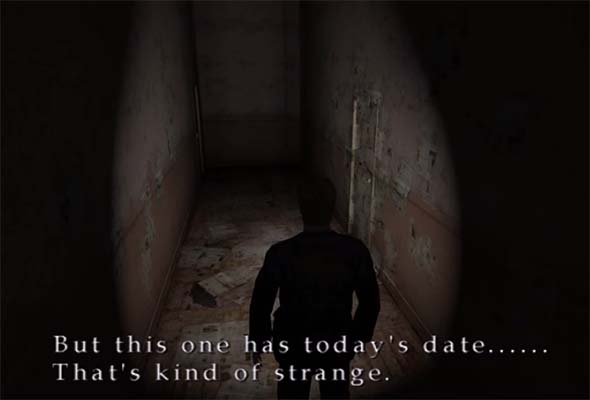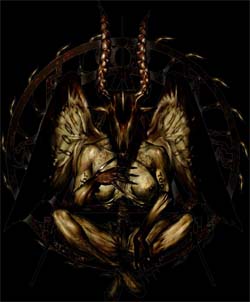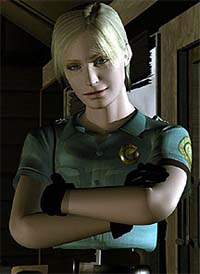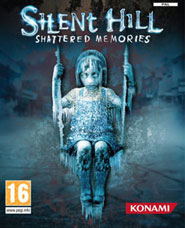
In the comments of a recent post about Silent Hill 2's Otherworld, I had a discussion with a reader about the time period in which the Silent Hill games take place. This is actually an interesting and difficult topic, so I thought that I would dedicate a post specifically to it.
First and foremost, let's remind ourselves of when the games were released:
| Game title | Original release |
 | Silent Hill | January 1999 |
 | Silent Hill 2 | September 2001 |
 | Silent Hill 3 | May 2003 |
 | Silent Hill 4: the Room | September 2004 |
UPDATE 1 January 2020:
A recent tweet from Masahiro Ito claimed that Silent Hill 2 was set in the "late 70's or early 80's", which would make my estimates about 10 later than Masahiro Ito understood the setting to be. If we take evidence in the first Silent Hill game at face value, this would mean that Silent Hill 2 would have to take place prior to the events of Silent Hill, since Silent Hill can take place no earlier than 1987.
It is also possible that Ito's comment is referring to the aesthetics of the game (in keeping with many of the game's film and literary influences), and not necessarily to its actual timeline. It isn't that I don't trust Ito's memory or his authority, but Team Silent went to great pains to conceal the exact date of the games (as we'll discuss in the following post), so it seems that they wanted the years in which the games take place to be ambiguous to the players -- which kind of makes this entire exercise moot.
Contemporary fiction
It is very important to note that no specific dates ever appear in any of the Silent Hill games that were developed by Konami's internal Team Silent studio. If dates are provided, they are either only the month and day (and not the year), or they are time periods relative to the events of the game (such as referring to the "events of 17 years ago" in Silent Hill 3), or it is just the year of an historical event in the past (such as the document about the sinking of the Little Baroness). Even documents that you would expect to have dates (such as newspapers, journals, diaries, patient reports, and police records) are intentionally left dateless (or at least ambiguous).
In Silent Hill 2, there is a point in which James finds newspapers scattered around a hallway. Upon examining the floor or walls, James comments that the newspapers have today's date. This would have been a perfect opportunity for the developers to provide a specific date for the game, if they wanted to. They could have had James read the date on the paper to the player, or the paper itself (with its date) could have been made clearly visible. The developers didn't do this; they left it completely ambiguous.

James notes that these newspapers have today's date, but doesn't tell us what the date is.
The developers went out of their way to not provide any specific dates for the games. Why would they do this? Typically, works of fiction that are not set in particular time period are written to be contemporary. Unless otherwise specified, most works of fiction should be assumed to take place now with respect to the consumption of the work by its audience, regardless of when "now" happens to be. if it's not contemporary to consumption, then it's usually contemporary to creation. This is usually pretty obvious if the work contains detailed descriptions of locations, technologies, and events that can be easily dated.
If we look at the original Silent Hill game in a vacuum, then the game provides no internal indication that it takes place at any specific time period. Players in 1999 probably had no reason to believe that the game took place in any year other than 1999. The same is true for Silent Hill 2, 3, and 4: if looked at in a vacuum, they can all be considered to take place in the same year that they were released. And if you didn't even know the year that the game was released, there's very little within the games to indicate that they take place at any time other than now.
However, this assumption falls apart because there is an absolute time difference of seventeen years between the events of the first game and the events of the third game, even though the difference in time between releases of the games was only four years. So we can't assume that each game takes place in the year of its release. At least one game has to be shifted on the timeline. So which game (or games) should be assumed to have taken place when? [More]
0ad2a2d3-abbc-4fd7-b255-126a5de4f3ba|8|4.8
Tags:Silent Hill, Silent Hill 2, Silent Hill 3, Silent Hill 4: the Room, history, Harry Mason, Heather Mason, James Sunderland, Maria, Henry Townshend, 1980s, 1990s, 2000s, 1986, 1987, 1994, 1999, 2003, 2008, 2016, Jeep Wrangler, telephone, cell phone, smart phone, rotary phone, computer, television, technology, anachronism, timeline, Konami, Team Silent, The Silence of the Lambs, Mary Shepherd-Sunderland

I was going through the comments on my posts a while back, and I came across a doozy of a comment by user Maiden T. I'm not going to replicate the entire post here, but you can review the comment at the link provided. In summary, the commenter asserts that Silent Hill, as a series, was never about occultism, and that all the games were "repressed-memory morality tales". The first Silent Hill and "to an extent the third one" are the exceptions (according to Maiden T).

Totally unrelated image of a demon god...
My mind just about exploded when I read this comment, and I started typing up a response, only to realize that I had written a whole blog's worth of counter argument. So, I decided to just turn it into a new blog. I'll continue my series of analysis and interpretation articles about Silent Hill with a write-up about how the series is most definitely about occultism.
What is Silent Hill about?
I've already tackled two topics that I consider to be common myths about Silent Hill. The first was about the over-sexualization of Pyramid Head, and the second was about the realness of the Otherworld. Now I'll address one of the most fundamental misunderstandings about the series: what is it about?
The repressed-inner-demon myth
Probably the most core and fundamental myth about the Silent Hill series is the continued propagation of the idea that the series (as a whole) is about characters dealing with repressed inner demons - typically a repressed memory of guilt over a perceived sin which they have committed. This idea is rooted in the popularity of Silent Hill 2. It is so pervasive, that the designers and producers of newer installments of the series embrace it, while dismissing the other critical elements of the other games' stories:
"[My favorite SH game is] Silent Hill 2. I didn’t really care for all the heavy occult based storyline in SH1 and 3. I felt SH2 had the best stand alone storyline, and provided the best atmosphere of all the SH games by far.
[...]
I find all the in’s and out’s of ‘The Order’ to be overly intricate and rather uninteresting, but that’s just my opinion."
- Devin Shatsky (producer, Shattered Memories, Downpour), in an interview with Hell's Descent (Nov 5, 2010).
The reason that Silent Hill 2's design was so successful (and unique within the series) is because SH2's excellent atmosphere was based around feelings of melancholy and depression rather than fear and threat.
Exploring a character's personal guilt and depression works great when the entire game is designed around that central, unifying theme! It doesn't work quite so well when ... [More]
04f88e94-11ac-43f4-beb3-1cd282060bf0|19|4.1
Tags:Silent Hill, Silent Hill 2, Silent Hill 3, Silent Hill 4: the Room, Silent Hill Origins, Silent Hill Homecoming, Silent Hill Downpour, Silent Hill Shattered Memories, Team Silent, Konami, cult, occult, fan fiction, horror, Harry Mason, Alessa, Dahlia Gillespie, Cheryl Mason, Heather Mason, James Sunderland, Red Pyramid Thing, Pyramid Head, Claudia Wolf, Vincent Smith, Henry Townshend, Walter Sullivan, Travis Grady, Alex Shepherd, Shepherd's Glen, Murphy Pendleton, ritual, Flauros, demon, god, Mary Shepherd-Sunderland

Stumbled onto this Gamefaqs forum topic about Masahiro Ito "confirming" that the Good ending of Silent Hill is canon, and that Cybil is supposed to die. Many fans apparently see this as absolute validation of their dogmatic opinions on the topic, and that to argue otherwise is moronic. I don't understand why there is so much vitriol thrown towards people who support the Good+ ending and Cybil's survival. Why does the fanbase want Cybil dead so much?
There are three key arguments that I hear in defense of the "Good is the only canonical ending" position:

Why do fans want Cybil dead?
- Harry wouldn't have known what the Red Liquid does until after he sees Kaufman use it on Alessa, and so he couldn't have used it on Cybil earlier.
- If Harry used the Red Liquid to save Cybil, then he couldn't have had any left over to solidify into the pendant for Heather.
- Cybil does not appear in any subsequent Silent Hill. She is not referenced in SH3, and in Silent Hill Homecoming, Deputy Wheeler refers to a female police officer who went to Silent Hill and never returned. Clearly, this means that Cybil is dead.
To many fans, these three arguments are bullet proof! At this point, they've practically become gospel (along with Pyramid Head's well-known rape antics).
But how well do these arguments really stack up to scrutiny? Let's play Devil's Advocate...
I'm going to start with Masahiro Ito's comments on the issue:
On Mashiro Ito's Twitter feed, he "confirms" that Cybil is dead.
[More]
94751804-81b6-4eed-b2d7-5732686eda1e|14|4.8
Tags:Silent Hill, Silent Hill 2, Silent Hill 3, Silent Hill 4: the Room, Silent Hill Homecoming, Konami, Team Silent, Masahiro Ito, Hiroyuki Owaku, Keiichiro Toyama, Cybil Bennett, Harry Mason, Cheryl Mason, Kaufman, Lisa, ending, red liquid, aglaophotis, pendant, possession, occult, Good vs Good+
This review was originally published 06/21/2010 on Game Observer (now defunct as of 05/13/2014). It has been republished here for archival purposes.
I originally tried to review this game in the shoes of an objective game critic instead of a Silent Hill fan. As such, I was far too generous to it. In the time since the game's release, my opinions of it have changed dramatically, and I'm a big enough boy to admit when I'm wrong. Thus, I will include updated commentary in areas of this review where my opinion has changed, and I will not disregard my fandom for the sake of mass appeal. :/

Climax perfectly poorly mixes the premise of the first Silent Hill with the psychological story-telling of Silent Hill 2 while laying the foundation for new "Horror" gameplay mechanics.
I’m a long-time fan of Silent Hill. I started with Silent Hill 2, which is my favorite game to date, and eventually made my way through the first game all the way up to the PSP’s Origins and last year’s craptacular Homecoming. I was very bothered to hear that Konami had disbanded the team that had worked on the first four games after the mixed critical and fan reception of The Room, and gave the development to a new team. Developers Double Helix and Foundation 9 completely dropped the ball with Homecoming, but Climax did a passable job with the story of Origins (even though the gameplay mechanics weren’t all that great) and Climax did a horrible job with Origins as well.
As you’re probably already aware, Shattered Memories is a re-imagining of the first Silent Hill game. It is NOT a port, nor is it a remake. Harry Mason gets in a car crash in the outer edge of the town of Silent Hill and wakes up to find his seven-year-old daughter, Cheryl, missing. He’ll proceed to explore the town of Silent Hill to find her, and along the way, meet several interesting annoying characters including a police officer named Cybil Bennett. But the similarities end there. [More]
ce74f430-6c69-40c8-8e6a-1f362ceb5c93|6|3.3
Tags:Silent Hill Shattered Memories, review, Silent Hill, Climax Studios, Konami, survival, horror, survival horror, PS3, PSP, Wii, Harry Mason, Cybil Bennett, fan fiction

One of the greatest strengths of the early Silent Hill games - developed by internal Konami studio Team Silent - is their exceptional character design. The characters presented in these games are among the best in all of gaming history at illiciting emotional responses from the players - both positive and negative.
It all starts at the top, as the protagonists of all three games stand tall and proud as paragons of game character design. This blog will contain major plot spoilers for Silent Hill 1-3. Read at your own risk!
Having relatable and likable characters is essential to the success of just about any horror story (whether in the form of a book, movie, game, or any other medium). It's hard to feel afraid for a character that you just don't care for.
Harry Mason of Silent Hill is a great example of a relatable "Joe Everyman" protagonist. Harry is a simple writer trying to take his daughter on a vacation. He wrecks his car and wakes up to find his daughter is missing in a seemingly deserted and haunted town that is closed off from the outside world. Harry isn't a superhero or elite special forces operative. He's just a guy. He could be anybody. This makes him instantly relatable to an audience. [More]
|

| 12 | | | | | | | 60 | | 11 | | | | | | | 55 | | 10 | | | | | | | 50 | | 09 | | | | | | | 45 | | 08 | | | | | | | 40 | | 07 | | | | | | | 35 | | 06 | | | | | | | 30 | | 05 | | | | | | | 25 | | 04 | | | | | | | 20 | | 03 | | | | | | | 15 | | 02 | | | | | | | 10 | | 01 | | | | | | | 05 |
|